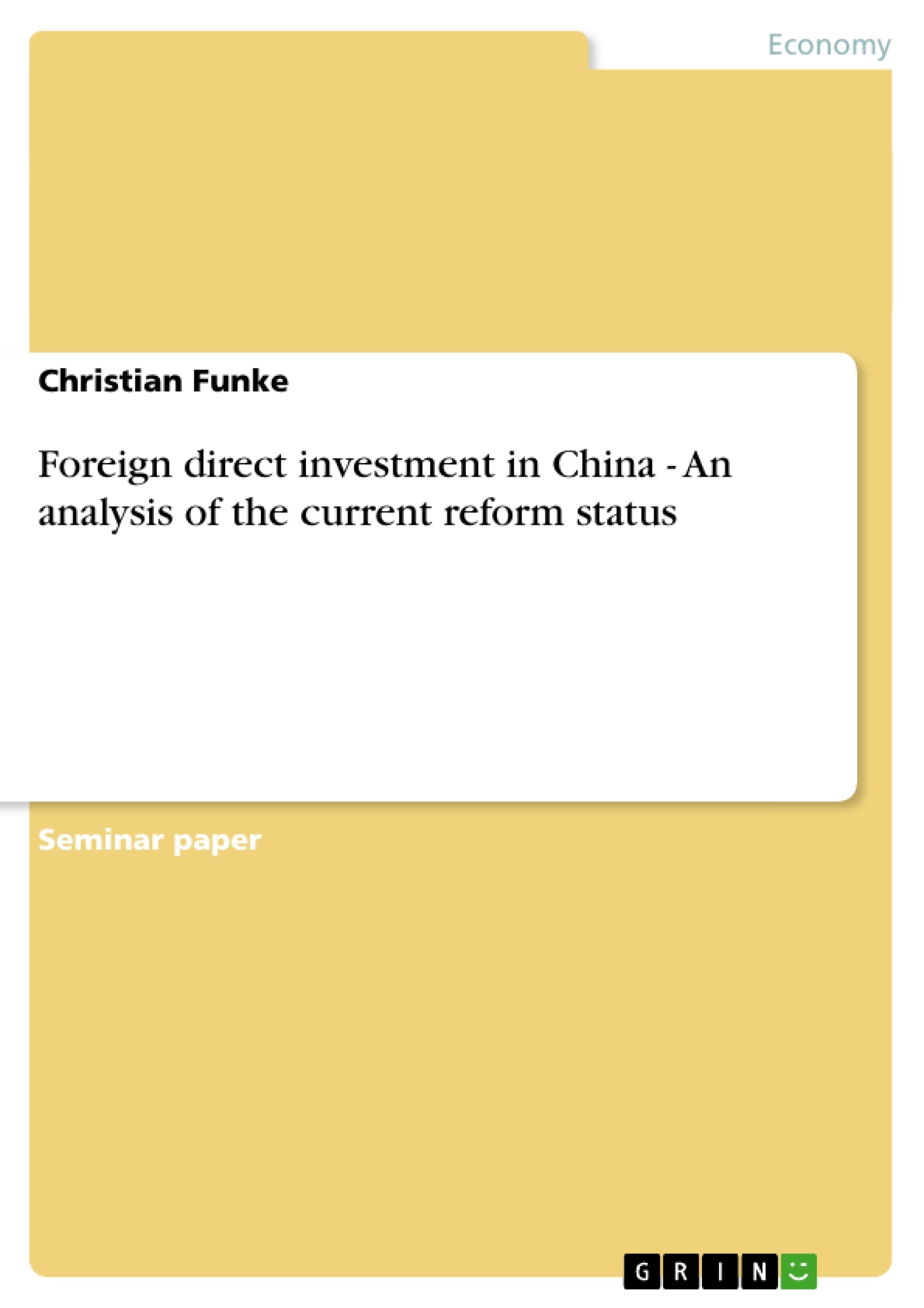This paper addresses the question whether China has made enough reforms to justify significant investments and which additional reform steps are needed. The People’s Republic of China (PRC) has shown tremendous Gross Domestic Product (GDP) growth in absolute and per capita terms of 9.3% and 8.0% per annum, respectively, over the last 25 years since market oriented reforms were started in 1978. Its GDP per capita has quadrupled over this period reaching around 1,000 US$ in 2003.
The market oriented reforms in China can be divided into two stages, dubbed “reforming the system” from for the first 15 years and “replacing the system” from 1993 onwards. In the second stage a significant determinant of China’s success has been its policy of opening up the economy and attracting foreign direct investment (FDI). FDI grew with a compound annual growth rate (CAGR) of 26.7%, and the growth rates in the 90s have even been more staggering with FDI reaching about 50 billion US$ in 2002. This FDI growth went hand in hand with growing imports and exports, reaching over 300 billion US$ in 2003 with a CAGR of 14.7% and 15.6%, respectively.
This paper aims at answering the question stated in the opening paragraph by analyzing the specific market oriented reforms which have taken place in the two stages of the Chinese reform process. The paper argues that China definitely has made enough reforms to justify the significant FDI which has been flowing into the country. However, there clearly is a need for more reforms as China becomes more and more interconnected in a globalized world economy, especially with joining the World Trade Organization (WTO) in 2001. Those reforms necessary to continue the Chinese success story will be addressed by analyzing reforms needed in the areas of the financial system, the rule of law, market liberalization and the governmental bureaucracy. The whole analysis will be guided by the analytical concepts of AHRENS 2002 as well as the institutional analysis in QUIAN 1999.
Inhaltsverzeichnis (Table of Contents)
- Introduction
- Market-oriented Reforms in the People's Republic of China
- Future Reforms Necessary to Safeguard Investments
- Concluding Remarks
Zielsetzung und Themenschwerpunkte (Objectives and Key Themes)
This paper aims to examine the impact of market-oriented reforms in China on foreign direct investment (FDI). The paper analyzes the reform process, including both its successes and the challenges that remain. It explores whether China has undertaken enough reforms to justify the significant FDI it has attracted and identifies further reforms needed to sustain this success. This paper utilizes the analytical framework of AHRENS 2002 and the institutional analysis in QUIAN 1999.
- The impact of market-oriented reforms on China's economic growth and FDI attraction
- The role of the Chinese government and the CCP in shaping the reform process
- The significance of international organizations like the IMF, WBG, and WTO in influencing China's reforms
- The need for further reforms in areas like the financial system, rule of law, market liberalization, and governmental bureaucracy
- The future prospects for FDI in China
Zusammenfassung der Kapitel (Chapter Summaries)
- Introduction: This chapter introduces the paper's objective, which is to analyze the impact of market-oriented reforms in China on FDI. It highlights the significant economic growth China has experienced since 1978 and its reliance on FDI as a key driver of this growth.
- Market-oriented Reforms in the People's Republic of China: This chapter examines the two stages of China's reform process, focusing on the role of domestic political players, including the central government, the CCP, and sub-national governments. It analyzes the impact of China's membership in international organizations like the IMF, WBG, and WTO on its economic reforms and FDI attractiveness.
Schlüsselwörter (Keywords)
The paper explores key concepts such as foreign direct investment (FDI), market-oriented reforms, economic growth, governance structure, Chinese government, CCP, IMF, WBG, WTO, financial system, rule of law, market liberalization, and governmental bureaucracy. It focuses on the relationship between these concepts and their impact on FDI in China.
Frequently Asked Questions
How has China's economy grown since the 1978 reforms?
China has achieved an average GDP growth of 9.3% per annum, with GDP per capita quadrupling over a 25-year period.
What are the two stages of market-oriented reforms in China?
The first stage (1978-1993) was "reforming the system," while the second stage (from 1993 onwards) focused on "replacing the system."
What role does Foreign Direct Investment (FDI) play in China's success?
FDI has been a significant driver of China's economic opening, reaching approximately 50 billion US$ in 2002 with a compound annual growth rate of 26.7%.
Which areas in China still require further reform?
Further reforms are needed in the financial system, the rule of law, market liberalization, and the governmental bureaucracy.
How did WTO membership influence China's reform process?
Joining the WTO in 2001 accelerated China's interconnection with the global economy and necessitated more stringent market-oriented reforms.
- Citar trabajo
- Dipl.-Kfm. Christian Funke (Autor), 2003, Foreign direct investment in China - An analysis of the current reform status, Múnich, GRIN Verlag, https://www.grin.com/document/20973



